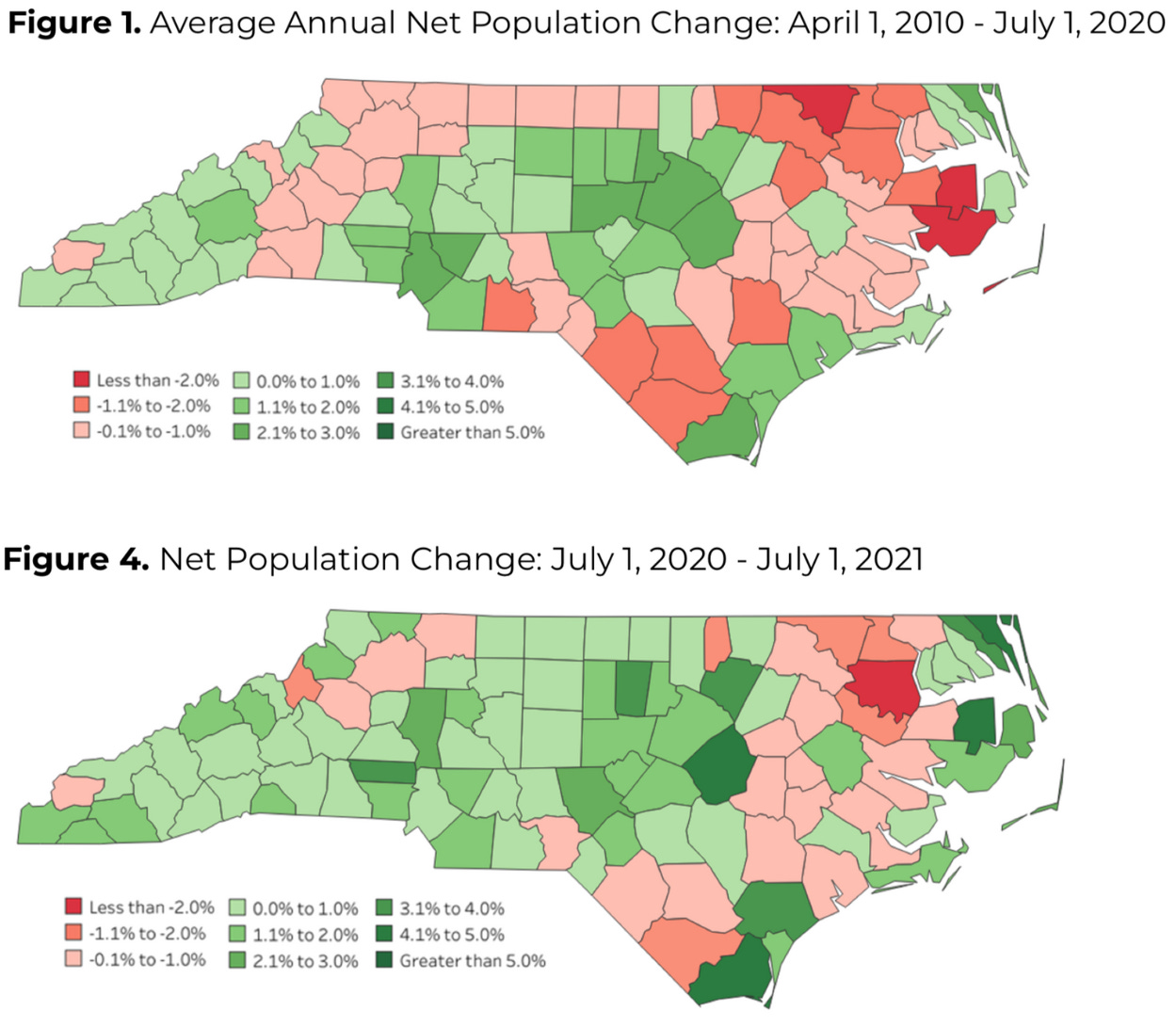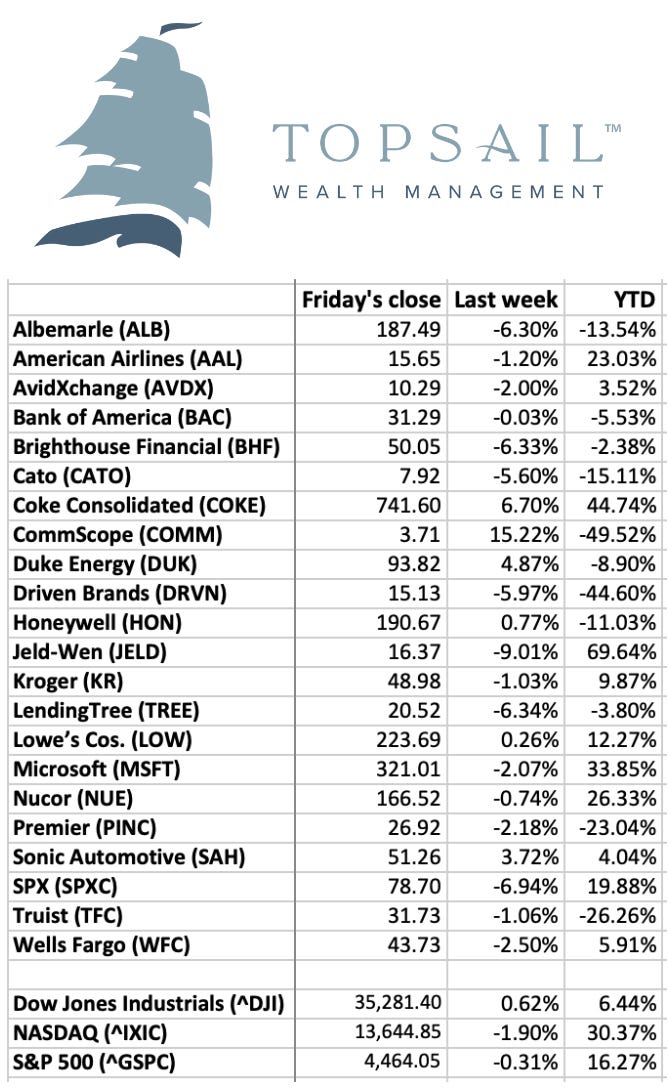N.C.’s rural rebound
Plus: UNC wants lawsuit dismissed; Health department warns of Covid 'surge' though hospitalizations are low; Cotswold Chick-fil-A reduced to rubble; East Charlotte pickleball court draws backlash
Good morning! Today is Monday, August 14, 2023. You’re reading The Charlotte Ledger, an e-newsletter with local business-y news and insights for Charlotte, N.C.
The Ledger exists only because of the support of readers. If you’re a Ledger member, thank you. If not … why not become one today? Details here.
Today's Charlotte Ledger is sponsored by T.R. Lawing Realty:
After losing population for years, many rural counties are drawing new arrivals after Covid, data shows; ‘A little bit of growth’ along the Tennessee border
by Tony Mecia
Over many decades, in many of North Carolina’s least populated areas, a familiar pattern has persisted: Factories close. Residents leave farms and small towns for better opportunities. Hardly anyone moves in.
Now, though, that longtime trend appears to have stopped.
New census data suggests that since Covid, the majority of North Carolina’s rural counties have attracted new residents in numbers unprecedented in recent years. Some of them are drawn by the ability to work from anywhere instead of having to report to an office.
Compared with figures in large counties such as Mecklenburg and Wake, the numbers of new rural arrivals are still small, and demographers question how much longer the trend might continue. But the bump in new rural residents represents a reversal of a longstanding trend, and officials in rural counties see the shift as an encouraging sign about their futures.
“We are not like Charlotte and Asheville, bursting at the seams, but we might have a little bit of growth,” said Matt Ward, economic development director in Mitchell County, population 15,000, which is two hours northwest of Charlotte on the Tennessee border.
Census data shows that in Mitchell County, between 2010 and 2019, 110 more people moved to the county than left, or about 12 a year. But between 2020 and 2022, the county gained a net 470 people moving there, or 235 a year — or 20 times the rate of the previous decade.
Ward says he thinks most Mitchell County residents would be happy with “nice, steady, small growth,” so long as it doesn’t become “something crazy like an Asheville or something bigger.” Traditionally, a mining company and the county’s hospital have attracted new residents, but now, he has heard about some newcomers who work remotely for tech companies such as Google. Mountain scenery, friendly people and land that’s cheaper than Boone, an hour to the east, are probably also draws, he figures.
It’s a trend playing out in communities throughout North Carolina and the U.S. that are outside of urban regions. A Charlotte Ledger analysis of census data shows that 37 of North Carolina’s 100 counties had more people moving out than in between 2010 and 2019. But since the start of Covid, the numbers have flipped in 75% of those counties, with 28 of them attracting more people than those who left between 2020 and 2022.
In addition, 13 out of 15 counties that barely grew in the 2010s, with fewer than 100 net new arrivals annually — like Mitchell County — improved on those numbers between 2020 and 2022.
In North Carolina, 78 of the state’s 100 counties are considered rural, and about two-thirds of them lost population in the 2010s as urban and suburban areas boomed. Besides people moving away, rural counties often decline in population because the number of deaths outpaces the number of births.
The recent shift in rural population in North Carolina likely stems from the prevalence of virtual work and from an increase in people retiring early during Covid, according to the report “Rural Relocators: Covid-19 and Rural Population Growth,” released in June by the N.C. Rural Center, which advocates for the state’s rural areas. The report concluded that “many rural counties that lost population from 2010 to 2020 experienced reversals of that trend, several others saw a slowing of population decline, and others that were already growing continued their growth.”
Many rural counties with population declines in the 2010s (pink and red) have rebounded in population since 2020 (green). (Maps from “Rural Relocators: Covid-19 and Rural Population Growth” by the N.C. Rural Center; republished with permission)
Patrick Woodie, the N.C. Rural Center’s CEO, said in an interview: “It’s not the strongest trend in the world, but after years of talking about population declines across rural counties, it’s a relief to be able to show in the numbers that we are seeing rural population growth.”
Rural counties with high-speed internet access, strong schools and proximity to larger cities are positioned the best to continue growing, he said.
Some demographers, though, doubt that the increases of the last two years are anything more than a small blip — and say that the larger trend will continue to be strong growth in urban areas.
“There is no evidence or reason to suggest that it’s going to be a massive shift from urban to rural — that’s certainly not the case,” said Nathan Dollar, director of Carolina Demography at UNC Chapel Hill’s Carolina Population Center. “There’s no real reason to suggest that this is going to be sustained growth of in-migration into rural areas.”
He says that from 2020 to 2021, at the start of the pandemic, there was a notable shift away from urban areas. Mecklenburg County, for instance, had more people moving out of the county than moving in, census data showed. But from 2021 to 2022, growth patterns in rural and urban areas more closely resembled pre-pandemic norms. Mecklenburg grew at about the same pace as in the 2010s, and the growth of rural counties slowed from a year earlier.
There could be some rural areas that continue growing, Dollar said, but it is less likely to be as widespread, he said.
“It could happen, but it would be in select rural areas, not all rural areas,” he said.
In Mitchell County, Ward says he sees the signs of growth: U-Hauls coming from Florida; people from Atlanta and Charlotte buying land; 45 building permits for new construction.
“If you’ve got that many building permits for new homes, and the traffic on our roads, that’s an indication there is activity here,” he said. “We’re not dying.”
Related Ledger articles:
“Surprise: More people leaving Mecklenburg than moving here” (July 25, 2022)
“Stronger growth returns to Mecklenburg in 2022 after dip” (🔒, March 31, 2023)
Today’s supporting sponsor is Landon A. Dunn, attorney-at-law in Matthews:
UPDATE: UNC seeks dismissal of lawsuit claiming the university improperly kicked out a Morehead-Cain scholar for sexual misconduct
The University of North Carolina system is seeking to dismiss a lawsuit brought by a former Morehead-Cain scholar at UNC Chapel Hill, who alleged that the university kicked him out after being falsely accused of sexual misconduct by four women.
In court papers filed in the last few months, lawyers with the N.C. attorney general’s office argue that a judge should throw out the 192-page federal suit brought by a student from Morganton who enrolled in UNC in the fall of 2019. They say that the former student, who is not identified by name in court papers, participated in university disciplinary proceedings and exercised his rights to an appeal — and that he failed to meet the legal threshold for finding the university at fault.
“The sheer length of the Complaint cannot make up for the lack of a factual or legal basis for Plaintiff’s claims,” state lawyers wrote in their reply to the lawsuit.
The Ledger was the first to report of the lawsuit’s existence, in March.
We wrote at the time:
The suit says the complaints stemmed mostly from incidents in the plaintiff’s sophomore year, in 2020-21, in which he had sexual encounters with three of the women, who were all in a common friend group — including two who were best friends and one who later dated the plaintiff’s roommate. It says three of the women compared notes in early 2021 and realized that they had separately had sex with him over the course of about three months, leading to some hurt feelings and jealousies.
He had four “sexual interactions” over the course of a night and morning with one woman who sneaked in through the window of his fraternity-house bedroom after matching with her on a college hook-up app; agreed to take a naked “selfie” with a second woman on an amorous weekend mountain getaway; and had about 40 “consensual sexual interactions” with a third woman over the course of about three months — including at a weekend-long stay at the Carolina Inn — during which time the pair was not an exclusive couple, the lawsuit says.
Anonymous lawsuit: The suit says the plaintiff’s family has a home in Morganton and a condo in Charlotte and that he was a Morehead-Cain scholar who joined the Kappa Sigma fraternity. The court agreed last month to let him proceed with the lawsuit anonymously, and to keep the names of his accusers out of court documents, because of the sensitive nature of the allegations and the risk of “reputational harm” if the names of those involved were made public.
UNC is also seeking to move the case from Asheville to the federal court district that’s closer to Chapel Hill. —TM
Related Ledger article:
Taking Stock, sponsored by Topsail Wealth Management
Topsail Wealth Management partners with you to provide personalized advice. Minimizing costs and the complexities of your wealth and investing plan.
How local stocks of note fared last week (through Friday’s close), and year to date:
Mecklenburg health department warns of Covid ‘surge,’ despite hospitalizations near all-time lows
Mecklenburg County’s health department is warning of what it’s calling a Covid “surge” — even as hospitalizations remain in the “low” range.
In a news release last week, the county said it is “advising residents of a summer COVID-19 surge.” County health director Raynard Washington was quoted as saying: “COVID-19 metrics have been increasing in the County this summer and could continue increasing into the fall.”
The latest state data shows 270 Covid patients hospitalized statewide as of Aug. 5. That’s about 80% more than a month ago, but 80% fewer than the most recent peak in January, when there were 1,620 patients hospitalized. The all-time high was 5,206 hospitalizations in January 2022, according to state data.
Mecklenburg’s health department is warning of a Covid “surge,” with statewide hospitalization levels 95% less than their January 2022 peak. (Ledger graphic, using data from N.C. Department of Health and Human Services)
The most recent Mecklenburg data shows 31 emergency room visits a day for “Covid-19 related illnesses,” up from 23 a day two weeks earlier. The county says 11% of ER visits result in hospitalization, which would be about three new patients per day. The Centers for Disease Control and Prevention characterizes Covid hospital admissions in all 100 N.C. counties as “low.”
What to do: The county health department said residents should get tested if they have what they believe is a summer cold and suggested that people with fading immunity “may want to play it safe” by avoiding indoor crowds and washing hands with soap and water more than usual. The statement made no mention of masks. —TM
Cotswold Chick-fil-A demolished to make bigger drive-thru; traffic outlook on Randolph Road brightens
A demolition crew reduced the Cotswold Chick-fil-A to rubble over the weekend, to make way for a replacement building that could prevent traffic from backing up into the street. In January, the City Council approved a rezoning allowing a drive-thru-only design that will expand the number of drive-thru lanes. The city has also said it plans to add a traffic light and a median. It is unclear how long it might take for the restaurant to reopen, but the Chick-fil-A on Woodlawn Road that underwent a similar transformation was closed for 9 months in 2021. In Cotswold, the adjacent Bojangles is also closed for renovations, and nearby, on Wendover Road in Grier Heights, there’s another Chick-Fil-A under construction that has been dubbed a “relief Chick-fil-A.”
You might be interested in these Charlotte events
Events submitted by readers to The Ledger’s events board:
THURSDAY: Charlotte City Council candidate reception, 6-7:30 p.m., Innovation Barn, 932 Seigle Ave., Charlotte. This drop-in mix-and-mingle reception co-hosted by the Charlotte Area Chamber of Commerce, CLT Public Relations and The Charlotte Ledger is an informal way to meet the candidates running for Charlotte City Council. (We’ll record brief interviews with candidates in attendance and share them in The Ledger.) Free, with registration.
AUGUST 26: Flip Turn Swim Clinic!, 9-10:30 a.m., West Charlotte High School (2219 Senior Drive, Charlotte). This class will teach beginner to intermediate adult swimmers the basics of competitive turns. Class size is limited to 20 participants, so claim your slot now! Spots are available for $50.
◼️ Check out the full Ledger events board.
➡️ List your event on the Ledger events board.
In brief:
Cotham says family was targeted: State Rep. Tricia Cotham of Mecklenburg County said her mother and son “were targeted in an aggressive incident of political road rage this week.” She said in a Facebook post that a driver of a Toyota screamed obscenities at them, displayed her middle finger and swerved toward them to try to “run my family off the road.” It is unclear if there is a police report of the incident. Cotham has been criticized by Democrats for switching from the Democratic to Republican party in April, a move that gave Republicans in Raleigh a veto-proof majority in the General Assembly. (Observer)
No rush on duplexes: Developers appear to be in no hurry to build duplexes in neighborhoods, after new development rules took effect June 1 that increase the number of places where duplexes and triplexes can be built. Just seven building permits were filed for duplexes in June and July in Mecklenburg County, compared with 20 a year ago. (Axios Charlotte)
Uptown Cabaret torn down: The Uptown Cabaret building on Morehead Street was demolished over the weekend. The building was on the site of a planned mixed-use development. (Axios Charlotte)
New political party recognized: The N.C. Board of Elections voted Sunday to allow the centrist group No Labels to place a candidate on the 2024 presidential ballot. (WFAE)
Pickleball conversion draws backlash: Some residents in an east Charlotte neighborhood off Central Avenue say they are puzzled by the county’s decision to replace a basketball court with a pickleball court, with one calling the conversion the “craziest and most tone-deaf” thing he has ever heard. The president of the Eastway Park / Sheffield Park neighborhood association said she requested the change after positive feedback from neighbors. (WFAE)
BPC council endorsements: The Black Political Caucus of Charlotte Mecklenburg endorsed all the incumbents in contested races running for re-election to the Charlotte City Council in this year’s primary, as well as Victoria Watlington for an at-large seat and Tiawana Brown for an open seat in District 3. (WFAE)
Escaped 900-pound bull is located and put down: Charlotte-Mecklenburg Police on Friday night located a 900-pound bull that had escaped on Moores Chapel Road — outside I-485 near the U.S. National Whitewater Center — and it was euthanized. Police issued two citations in connection with the case. (WSOC)
Programming note: The Ledger’s Lindsey Banks discussed her article on post-Covid speech delays in young children with WFAE’s Marshall Terry last week. You can read a transcript or listen to their conversation here.
Need to sign up for this e-newsletter? We offer a free version, as well as paid memberships for full access to all 4 of our local newsletters:
➡️ Opt in or out of different newsletters on your “My Account” page.
➡️ Learn more about The Charlotte Ledger
The Charlotte Ledger is a locally owned media company that delivers smart and essential news through e-newsletters and on a website. We strive for fairness and accuracy and will correct all known errors. The content reflects the independent editorial judgment of The Charlotte Ledger. Any advertising, paid marketing, or sponsored content will be clearly labeled.
Like what we are doing? Feel free to forward this along and to tell a friend.
Sponsorship information/customer service: email support@cltledger.com.
Executive editor: Tony Mecia; Managing editor: Cristina Bolling; Staff writer: Lindsey Banks; Business manager: Brie Chrisman, BC Creative








